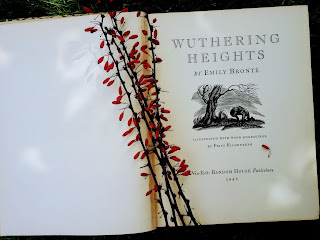Wuthering Heights by Emily Brontë
Withering Hopes
Wuthering Heights by Emily Brontë is a doozy. I
say that not because it’s long; it only seems that way but, in my opinion,
those two hundred and twelve pages overstayed their welcome. It really falls
into the doozy category because it’s a rough read. This is a story of
some pretty mean people, starting with Heathcliff and Catherine and ending…well,
with everyone else. I’ve seen it referred to as a love story, but I failed to
see tender love or romance.
Heathcliff is adopted by the
Earnshaw family and falls in love with his stepsister Catherine. Hindley,
Catherine’s blood brother, is jealous of the attention Heathcliff is getting from his father, and a nasty little wedge
is formed in the family unit. The book is full of feuds and drama and “vinegar-faced”[1]
people who yell at each other, degrade one another, slap heads, box ears, and
threaten bodily harm with knives. They’re
real downers who got under my skin. The
more I read, the more I wanted to escape from this bitter band of malcontents.
I think that even if Justin Timberlake danced, danced, danced into their lives
with sunshine in his pockets, it wouldn’t crack their vile veneers.
What further soured me was that the storyline can be very perplexing at
times, because it spans a couple generations and in those times they named
their kids with the same first names as their parents or other relatives, or
they used last names as first names. And since Heathcliff only has one name, it
gets even more confusing. There’s Heathcliff and a Linton Heathcliff, and
an Edgar Linton, Catherine Earnshaw Linton, Catherine Linton Heathcliff. See
what I mean? Print out a family tree before you get going on this one.
I would really like to know if I’m the only one who felt like
this. Were others as confused and
disheartened as I was? What’s that? I
didn't hear you. Post a comment or email
me at Readinginthegarden@gmail.com
and let me know what you thought about the book. Maybe I just wasn't in the mood for the
story, either time. That's right, I read it twice and my hopes for liking it any better the second time withered quickly. Sure, it happens once in awhile and, unfortunately, that’s how good books get bad reps. I started The Good Earth by Pearl S. Buck once
and put it down because I just found it boring.
Years later I picked it up again and, waddayaknow, I loved it. But after reading Wuthering Heights twice, well it didn't pass that test.
On another note, I want to give kudos to my mother who chose
this book as her first English reading selection. English is her second language and she conquered
a challenge with this one! Go mom!
Oddly enough, I did like Emily’s
writing style. I could pick out handfuls of quotes I liked. Here are some of them.
I have to remind myself to breathe—almost remind my heart to beat!(Heathcliff at the end seeing Catherine everywhere.) Emily Brontë, Wuthering Heights (1847; reprint, New York: Random House Publishers, 1943), 204.
…I joined an unsociable meal, seasoned with reproofs on one side and sauciness on the other.
Emily Brontë, Wuthering
Heights (1847; reprint, New York: Random House Publishers, 1943), 34.
Whatever our souls are made of, his and mine are the same...(Catherine about Heathcliff) Emily Brontë, Wuthering Heights (1847; reprint, New York: Random House Publishers, 1943), 50.
Happy reading!
Annette
[1] “Vinegar-faced Joseph projected his head from a round window of the barn.”
Emily Brontë, Wuthering Heights (1847; reprint, New York: Random House Publishers, 1943), 5.





Comments